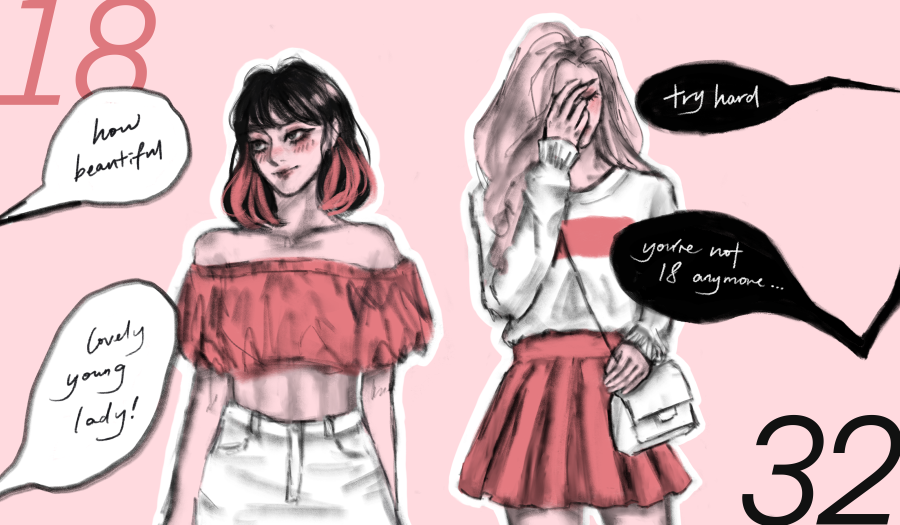Feminity is a double-edged sword. Societal standards have people believe that embracing the mundane, yet overly influential “lady-like” behaviors and norms will reinforce their identity as a woman. The con? Amongst a variety of things, now you’re reduced to being two-dimensional, almost as if you’re underqualified to engage in daily tasks. Even caring conversation becomes a space where others assume you lack proficiency in subject matter and have you remain someone who listens and rarely needs to speak. The obvious, yet often characterized as “inappropriate” panacea is simple — speak anyways. But speaking, especially after it’s been established you are not in the place to, is rude, and being rude is not ladylike; so the mere act of speaking takes you from someone who advocates on their own behalf to a brash, ill-mannered woman. If you do not want your femininity stripped, not speaking is an option, and then you get to be a closer fit to society’s ideal woman, and all it costs is your voice. You’ve won the battle, yet lost the war. For those who desire to speak and still be respected as a woman, the real remedy is not something directly in their realm of action. The true cure-all is actually simple: society needs to learn to stop speaking over women and prioritize listening to them.
Femininity, historically, has long been about gentleness, cooperativeness, and passivity. In the 1830s, via the Moral Encyclopedia, women were reminded that there was a precedent that constituted their womanhood, and failing to meet such expectations leads to deviation from an acceptable woman. The Moral Encyclopedia, previously an attempt at extending “instructional” advice, is now a text that allows us to identify how dated the criteria for womanhood is.
While many of the overreaching suggestions are denounacable and unfortunately can be found in modern times, one that has truly triumphed is the notion that if women want to speak, they should make sure it is about things they understand. As there have often been reservations about the intellectual ability of women, they find themselves on the receiving end of getting interrupted in conversation quite often.
Interrupting women has played into social dynamics that have fortified the notion of women as less powerful than their male counterparts. Mansplaining, the common occurrence of men condescendingly speaking to women about something they have incomplete knowledge of, reestablishes the man as the superseding figure in the social dynamic. The act involves interrupting women and questioning the validity of their knowledge, ultimately perpetuating both gender stereotypes and inequality. The issue of women being cut off and silenced in conversation is so prominent that in a study in 2015, it was found that women are more likely to be interrupted in conversation. That seemingly trivial occurrence is enough to push rhetoric that labels women as “unintelligent” and “underqualified.” Instances when women speak up, get undermined, too, as they are now antagonizing other team members.
A woman who tries to speak up poses risk for being labeled an angry woman, and historically, society has not been too keen on women who are anything but tender and kind. Women are not taught to be angry, they’re taught to be nurturing, they’re taught to be poised. Research can point to women being less “likable” to the public when they advocate on their own behalf, when they’re assertive, or when they begin to deviate from the image of soft. This stance can often be used to invalidate women’s input or label them as hysterical or overly emotional. This is especially a concern for women of color who already face being diminished to a stereotypical trope.
While society dislikes angry women, they especially dislike angry women of color. Speak with too much conviction and you’re the “angry black woman” or “emotional latina”. In 2018, tennis star Serena Williams was chastised for coming off too aggressively after receiving a code violation, and in the years since the incident, women of color as a whole still have reservations about speaking on their own behalf. 28–44 percent of women of color minimize their ethnic and cultural identity when in the workplace, often not wanting to have either be a reason they are not taken seriously within their work environment.
Some may comment “well, if women want to be taken seriously and treated with respect, they should recognize how to speak to others.” Sure, no one deserves to be on the receiving end of anyone who is very evidently angry at the workplace. Each case is subjective, and not every woman who does not smile and nod is overly assertive, maybe they are just tired of biting their tongue when being mislabeled and spoken over.
At a school such as UC San Diego with many non-female identifying, especially male, students who will inevitably work alongside female students, please be aware of how you speak to women. Your tone, word choices, and failure to listen contributes to women being pushed under the rug in academic and vocational spaces. The women in your classes, nor in society, need to be overly kind and soft spoken to be an excellent classmate or partner. And if you find yourself on the receiving end of what you find to be a “mad” woman in the classroom, do ask yourself: are they emotional or are they speaking in a manner that you would have found acceptable for those who are not held to the standard of femininity?
Art by Angela Liang for the UC San Diego Guardian.














